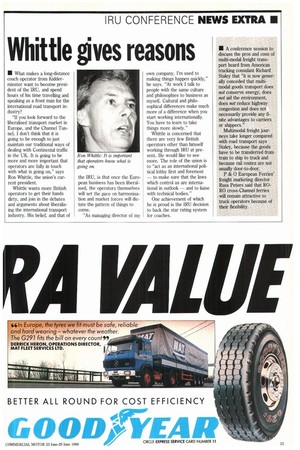Whittle Oyes reasons
Page 25

If you've noticed an error in this article please click here to report it so we can fix it.
• What makes a long-distance coach operator from Kidderminster want to become president of the IRU, and spend hours of his time travelling and speaking as a front man for the international road transport industry?
"If you look forward to the liberalised transport market in Europe, and the Channel Tunnel, I don't think that it is going to be enough to just maintain our traditional ways of dealing with Continental traffic in the UK. It is going to be more and more important that operators are fully in touch with what is going on," says Ron Whittle, the union's current president.
Whittle wants more British operators to get their hands dirty, and join in the debates and arguments about liberalising the international transport industry. His belief, and that of the IRU, is that once the European business has been liberalised, the operators themselves will set the pace on harmonisation and market forces will dictate the pattern of things to come.
"As managing director of my own company, I'm used to making things happen quickly," he says. "At work [talk to people with the same culture and philosophies to business as myself. Cultural and philosophical differences make much more of a difference when you start working internationally. You have to learn to take things more slowly."
Whittle is concerned that there are very few British operators other than himself working through IRU at present. He would like to see more. The role of the union is to "act as an international political lobby first and foremost — to make sure that the laws which control us are interna tional in outlook and to liaise with technical bodies."
One achievement of which he is proud is the IRU decision to back the star rating system for coaches.
• A conference session to discuss the pros and cons of multi-modal freight transport heard from American trucking consulant Richard Staley that "it is now generally conceded that multimodal goads transport does not conserve energy, does not aid the environment, does not reduce highway congestion and does not necessarily provide any finite advantages to carriers or shippers."
Multimodal freight journeys take longer compared with road transport says Staley, because the goods have to be transferred from train to ship to truck and because rail routes are not usually door-to-door.
P & 0 European Ferries' freight marketing director Russ Peters said that RORO cross-Channel ferries will remain attractive to truck operators because of their flexibility.
















































































































































